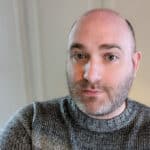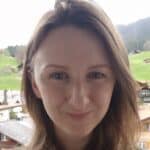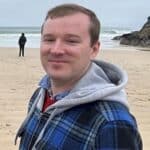Profile
Nuno Brito
-
About Me:
I am a Portuguese PhD student living, studying and researching in Plymouth. I specialize in a branch of Theoretical Physics called Quantum Field Theory, which tries to describe how particles behave and interact with each other. Whenever I am not pushing the boundaries of our physics knowledge, I am either working out or playing (maybe too much) computer games!
-
My pronouns are:
He/Him
-
My Work:
I am a physicist, specializing in the theoretic side of Physics. Specifically, my area of expertise is Quantum Field Theory, the field that tries to describe particle and sub-particles dynamics and interactions.
-
Read more
Within Quantum Field Theory, there are several, more specialized branches depending on the approaches you take to tackle a problem. My specific field is called Lattice Quantum Field Theory.
Lattice Quantum Field Theory
In Lattice Quantum Field Theory, the space-time continuum is discretized into a grid that can be simulated on a computer. After the theory is translated to a computer, we can solve complicated equations on the computer and simulate several different theories. Ideally, the numbers that we obtain match the ones from experiments, meaning that our theory is close to reality! For this we work in close collaboration with experimental physicists.
Supercomputers
These simulations require a lot of computational power. Recently, I completed a project that required over 7+ million CPU-hours. This is 1024 CPU cores running non-stop for over 3 months! To learn how to work and harness the power of super-computing clusters is super satisfying!
From Quantum Chromodynamics to Quarks and Gluons to Glueballs
To further give details on what I am specifically studying; within Quantum Field Theory, there are several theories that attempt to describe the behaviour of the different particles in our world. Some of these particles you have probably heard about (photons, electrons) but there is a whole zoo of particles and sub-elemental particles. One of these theories is called Quantum Chromodynamics, the theory of the strong interaction. This theory describes how quarks and gluons (that live inside the atom’s protons and neutrons) interact and behave. This theory is now over than 70 years old.
However, there is a particle, made only of gluons that has never been detected, and there is no reason from the theory to believe that it should not be observed. These mystical object is called a Glueball!
This particle could be the next big thing in physics but we have first to find it or understand why we can’t find it! It could be key to a new energy generation technology much more efficient that nuclear or hydrogen energy but for that first we must understand.
-
My Typical Day:
I wake up at around 8-9AM, sometimes I don’t really set an alarm and just sleep in! Then I go to my office and work on my research until 4-5PM. I usually have lunch with my colleagues from 1 to 2PM. After 5PM I leave to the gym, workout and get home at around 7PM. Then it’s time to prepare dinner, and play some computer games until ~11PM. Before going straight to sleep, I read a couple pages of a book.
-
Read more
I am glad you clicked “read more” because there is something very nice about being a researcher: Flexibility.
The routine that I have above is something I do often but not everyday! Being a researcher in a theoretical field means that I can work from anywhere, anytime, as long as I have my brain and my computer on me! So, I can:
- Workout in the morning and work until dinner instead;
- Maybe not work at all whenever I am having an off day, no one is clocking my work time!
- Work while traveling! Nothing is really stopping us from taking a trip somewhere and work at the same time! I do this a lot to visit my family back in Portugal while working!
The important thing is not how long or when you work, it is to get the actual work done. If you can complete the tasks for the day in a hour, then that is all you need to do.
Note: The university does perform a couple of engagement checks on its research students and there are a couple reasonable conditions that they ask from you, but all within reasonable limits.
-
Education:
In Portugal, from Year 1 to Year 12 were done across 3 different schools in my hometown, a small village in the centre of Portugal. Then I went to University of Coimbra for my bachelors and master’s degree. Both were specialized towards theoretical and mathematical physics. Finally, afterwards I applied to a UKRI STFC PhD studentship at the University of Plymouth which I was awarded!
-
Qualifications:
Completed Highschool.
Bachelor’s Degree in Physics.
Master’s Degree in Nuclear and Particle Physics.
-
Work History:
Some side jobs that I did in the past include working at a Swimming Pool during the summer of 2015 and working at a café a couple of afternoons in the summer of 2016.
During university I found helpful to engage with some extra curricular activities. Some of this included 3 research grants that I was awarded during my years in Coimbra, extra Mathematics modules that I chose to attend to and summer internships.
-
Current Job:
PhD student at the University of Plymouth, specializing
-
My Interview
-
How would you describe yourself in 3 words?
theoretical-physicist, super-computers, quantum-mechanics
What did you want to be after you left school?
Physicists/Mathematician.
Were you ever in trouble at school?
Not to any worrying degree.
If you weren't doing this job, what would you choose instead?
Something related to maths, maybe after-school tutoring or maybe some programming job!
Who is your favourite singer or band?
My music taste oscillates faster than neutrino oscillation.
What's your favourite food?
Lasagna, Canelones, Francesinha (portuguese dish) or a good steak
If you had 3 wishes for yourself what would they be? - be honest!
Become a famous Physicist, explore remote places in the world, travel to space one day.
-






